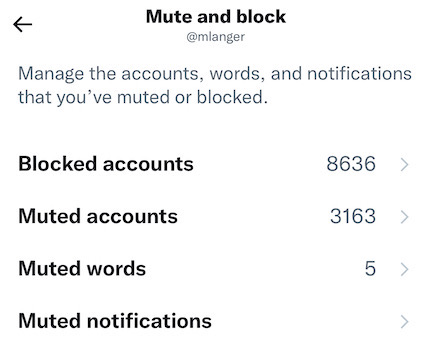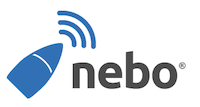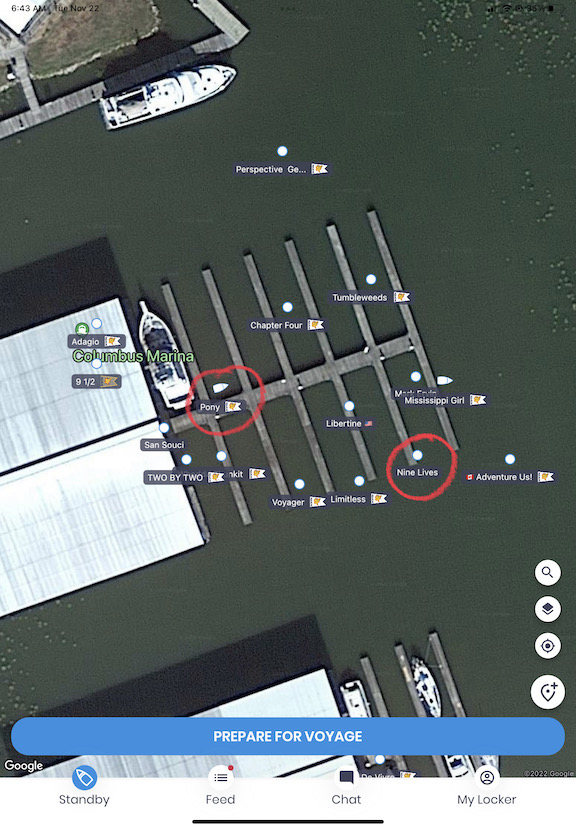My ever-changing take on social networking.
I’ve been thinking a lot about socialization these days and I thought I’d say a few things about how I stay in touch with friends (and strangers) while living a relatively solitary life.
Twitter and Mastodon (and Facebook)
I’ve been on Twitter since April 2007 and have tweeted more than 147,000 times. (I have a lot to say.) I’ve always liked Twitter since it filled a gap in my working life. In the years when I worked from home writing computer how-to books and articles and video training materials, I had no social interaction with co-workers. Twitter became my “water cooler” — the place I’d go when I needed a short break from work and some interaction with other people.

I don’t tolerate bullshit. I block all trolls and assholes and mute all advertisers.
Twitter changed over the years, of course. It was weaponized by political parties and states through the use of misinformation, bots, and trolls. I kept ahead of most of this by simply blocking the accounts I didn’t want to see. I’d also mute accounts that promoted their tweets. And I curated my timeline by being very careful who I followed and unfollowing people who tweeted or retweeted a lot of crap. Still, doomscrollling became a thing, even in my carefully curated timeline.
Of course, in recent days, after the takeover by Elon Musk, Space Karen, Twitter has pretty much gone to hell. It started with the new policy that allowed users to buy a Verified tag for their account and the rampant impersonation of real people and companies. Some are funny, some aren’t. One impersonation cost Eli Lilly (and Twitter) millions of dollars. Then there was the return of hate speech, in force, starting with rampant anti-semitism. That was only made worse with the reactivation of the previously suspended accounts for Donald Trump and Kanye West. Thanks to the loss of more than 75% of its staff, Twitter has become somewhat unreliable and there’s virtually no moderation of content.
Basically, Twitter is flushing itself down the toilet and there’s not much anyone can do about it.

Like a few other folks I know on Twitter, I opened an account on Mastodon (@mlanger@mastodon.world), which is a Twitter-like service made possible by decentralized networked servers. It’s a lot like Twitter was in the early days, but because it’s a bit funky to set up, it’s naturally weeding out the social media idiots most of us don’t want to see anyway. I’ve decided to build my Mastodon experience to be a politics-free, hate-free, anger-free world and I’m doing that by simply not following accounts that toot (instead of tweet) politics, hate, or anger. I’m filtering out posts with topics that I don’t want to see or don’t interest me. I’m muting accounts that post primarily politics. I’m basically building a social networking bubble.
Now before you get all critical about that, try to see it my way. I don’t go on social media to get the news or to learn what’s going on in the world. I listen to NPR and have a subscription to the Washington Post. That’s where I get my news. I have no interest in the stories put out by MSNBC, CNN, Fox News, Mother Jones, or just about any other media outlet so why would I want to read social media tweets that link to them?
What am I on social media for? Well, I mentioned it right at the top of this post: social interaction with other people.
Here’s how I see it: I live alone and don’t go out to a job like most people. My daily social interaction is minimal. In addition to meeting up with friends and neighbors at occasional social gatherings, I’m pretty much limited to text and phone conversations with friends and brief messages on Twitter and Mastodon.
(Don’t talk to me about Facebook. That site will rot your mind — it’s a cesspool of hate and lies. And don’t give me the excuse that it’s the only way to keep up with family and friends. These people don’t have phones and email addresses? The only way you can communicate with them is in a toxic environment where you won’t even see their posts unless the algorithm shows you? The only thing Facebook is good for is finding out how stupid/bigoted/gullible your friends and family really are.)
Now that I’m on Mastodon and building a whole new social media world from scratch, I’m really enjoying meeting people with similar interests — especially those that aren’t trying to sell a product or idea. It really is just like the old days on Twitter. You’d meet someone and hit it off and interact, chatting about things going on in your lives. You’d build friendships. Heck, I’ve met in person at least a dozen of the people I’ve met on Twitter, including the first person I ever followed there, who lives in the UK.
Nebo and the Boating Forums
Now that I’m seriously into boating — as I once was seriously into aviation — I’m making friends in the boating world. There are two main tools I’m using to do that.

Nebo is a boating app that lets you share your boat’s location with others. The idea is that you can keep track of where your boating friends are, show them where you are, and possibly meet other boaters in your area. I used it on my other two boat trips to share each day’s cruise with friends and blog readers. But now that I’m cruising at my own pace and meeting folks along the way, I’m using it to keep track of where they are.
Nebo has a built-in chat feature to get in touch with boaters you find on the app. (There are privacy settings to keep your boat invisible or your information invisible to strangers, in case you’re wondering.) As I prepare to return to my boat very late in the season, I’m trying to connect with other boaters in my area. I’ve successfully chatted with a few, including one couple that has done the Great Loop 33 times.
Because I’m not using Nebo every day (since I’m not currently on the water), I’ve pretty much switched over to texting for my closest boating friends. But I still use Nebo to see where they are. (I can’t wait to get back to them.) And if you’re interested in seeing where my boat is, you can find it here.

I can see that this morning both Pony and Nine Lives are at the Columbus Marina with a bunch of other Loopers on Nebo. La Principessa is heading south on the Tennessee River a bit farther north. I’ll likely catch up with them before we hit the Gulf.
Other sources of social interaction with fellow boaters are the two boating forums I follow:

TugNuts is the Ranger Tug/Cutwater boats support forum. It’s a great place to share information about our boats. I scan the new messages every morning and participate in conversations where I have something to add. I also use it to get information when I have a question or problem. For example, I was having a heck of a time getting engine computer data to interface with my chart plotters. I posted about my problem and had two good answers within 24 hours.

MTOA is the Marine Trawler Owners Association. Like TugNuts, it’s a great source of information for boaters, but it’s not boat specific. I use it to get more general information about cruising, especially about places to cruise. A list of new posts comes to me in email every morning and I use that to pick out the discussions I might want to see and participate in.
Both of these forums require membership. MTOA requires an annual membership fee. Both forums have resulted in members contacting me directly via e-mail — I allow them to do so — about topics I’ve participated in. I’ve gotten a lot of excellent information and offers for meet ups with other boaters. It’s nice. (And yes, I know I did gripe about some of the old guys in these forums, but they are the exception and not the rule.)
My Point
I guess my point is this: Social networking doesn’t need to be an addictive anger- or hate -inducing doomscrolling mechanism. It can be pleasant and informative. It can be a way to meet people with similar interests and keep in touch with them.
It can be what you want it to be — if you focus on what you do and don’t want to see and take steps to get the content you really want.
—
Featured image by Image by Freepik.


